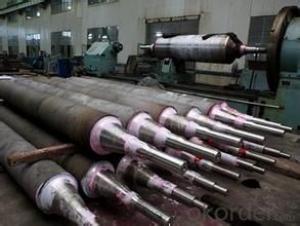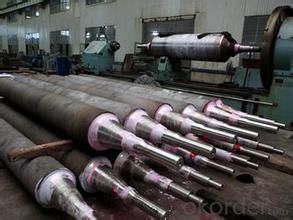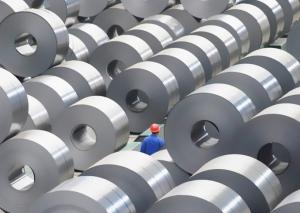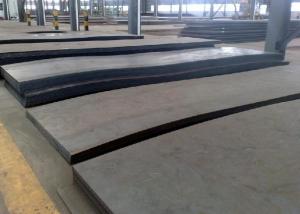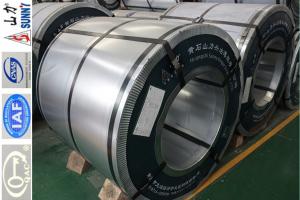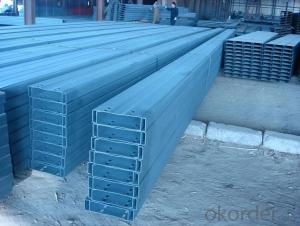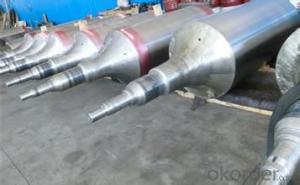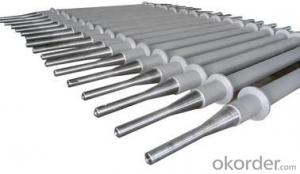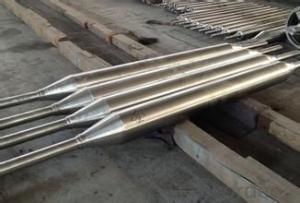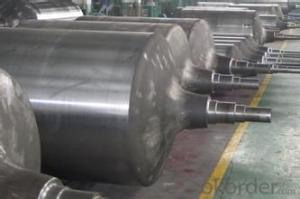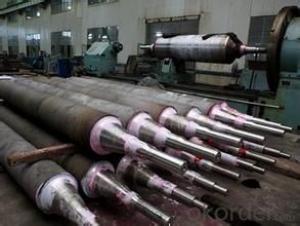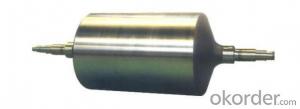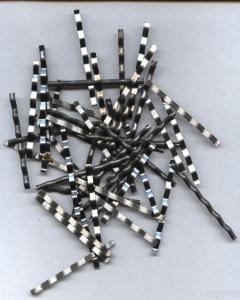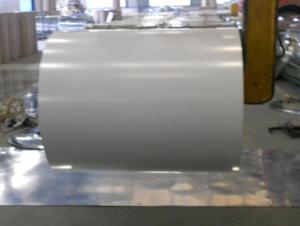Centrifugal Casting Heat Resistant Furnace Roll for 2015
- Loading Port:
- Tianjin
- Payment Terms:
- TT OR LC
- Min Order Qty:
- 1000 PCS
- Supply Capability:
- 10000 PCS/month
OKorder Service Pledge
OKorder Financial Service
You Might Also Like
Quick Details
| Model Number: | DTC | Application: | Heat Treatment Furnace | Material: | Aluminum,heat resistant alloys,cobalt base alloys |
| Dimensions: | OEM | Dimension: | OD70 to 1400mm | Standard: | ANSI, ASTM, ASME, DIN, GB |
| Technicas: | Centrifugal casting | TEST: | PT UT RT |
Packaging & Delivery
| Packaging Detail: | wooden case |
| Delivery Detail: | 30days |
Specifications
1)bulk production
2)full test instrument and strict quality control system
3)best price
centrifugal casting heat resistant furnace roll
Material | High nickel and high chrome heat resistant alloys, cobalt base alloys, like HU, HT, HK, HP, HW, 24/24NbTiZr, 50Cr/50Ni (2.4813), 1.4865, 1.4849, 1.4848, 1.4410, 1.4059, 1.4841, 1.4845, 1.4852, 2.4879 or as per customer's requirements
|
Application | Working at high temperature environment on average: 800 to 1200°C,used in steel mills like continuous annealing furnace, heating treatment furnace, etc. |
Process | Barrel/tube is made by centrifugal casting and will be machined subsequently. Shaft/journal will be |
Standard | ANSI, ASTM, ASME, DIN, GB |
Specification | According to drawings |
- Q: How is carbon steel different from stainless steel?
- Carbon steel and stainless steel are both alloys of iron, but they differ in their composition and properties. Carbon steel contains a higher amount of carbon, making it more susceptible to corrosion and rust. On the other hand, stainless steel contains a higher amount of chromium, which forms a passive oxide layer that protects it from corrosion. This makes stainless steel more resistant to rust and staining than carbon steel. Additionally, stainless steel has a higher tensile strength and is more durable, while carbon steel is typically less expensive and more malleable.
- Q: How is steel pipe threaded for plumbing applications?
- Steel pipe is threaded for plumbing applications using a process called threading, which involves cutting helical grooves or ridges on the external surface of the pipe. This is typically achieved using a threading machine or a die set. The threaded ends of the pipe can then be connected to fittings, allowing for a secure and leak-resistant plumbing system.
- Q: What are the advantages of using steel in high-rise buildings?
- There are several advantages of using steel in high-rise buildings. Firstly, steel has a high strength-to-weight ratio, allowing for lighter and more efficient structural designs. This, in turn, reduces the overall weight of the building and enhances its stability and safety. Secondly, steel is a highly durable material that can withstand extreme weather conditions, earthquakes, and fire, making it ideal for tall buildings. Additionally, steel's flexibility allows for easy modifications and expansions in the future, ensuring adaptability and longevity of the structure. Lastly, steel is a sustainable and recyclable material, promoting environmental consciousness and reducing construction waste.
- Q: How are steel products used in the construction of public transportation systems?
- Steel products are extensively used in the construction of public transportation systems due to their strength, durability, and versatility. Steel is commonly used in the fabrication of railway tracks, bridges, tunnels, and station structures. It provides the necessary structural support, ensuring the safety and reliability of the transportation system. Additionally, steel is used in the manufacturing of various components such as train cars, bus frames, and tramlines, contributing to their longevity and resistance against wear and tear. Overall, steel plays a crucial role in the construction of public transportation systems, enhancing their efficiency, sustainability, and overall performance.
- Q: How is steel sheet metal stamped for automotive parts?
- Steel sheet metal is stamped for automotive parts through a process called sheet metal stamping. This involves using specialized machines and tooling to cut, bend, and shape the steel into the desired automotive component. The process typically includes steps such as blanking, piercing, forming, and trimming to achieve the required shape and dimensions.
- Q: What are the different grades of steel?
- There are several different grades of steel, classified based on their composition and properties. Some common grades include mild steel, stainless steel, high-strength low-alloy steel, and tool steel. Each grade is designed for specific applications and offers varying levels of strength, corrosion resistance, hardness, and other desirable characteristics.
- Q: How is steel wire mesh used in filtration systems?
- Steel wire mesh is commonly used in filtration systems due to its durability and high tensile strength. It acts as a barrier, allowing only particles of a certain size to pass through, effectively separating impurities from fluids or gases. The mesh's uniform and precise openings ensure efficient filtration, making it ideal for applications such as water treatment, oil and gas filtration, air purification, and industrial processes requiring particle removal.
- Q: What are the different types of steel angles and channels available?
- There are several different types of steel angles and channels available, including equal angles, unequal angles, C channels, and U channels. Equal angles have equal sides and are commonly used for structural applications, while unequal angles have different side lengths and are often used for bracing or support in construction projects. C channels have a C-shaped cross-section and are typically used for structural support, while U channels have a U-shaped cross-section and are often used for edging or framing.
- Q: What are the applications of steel mesh in security fencing?
- Steel mesh has various applications in security fencing due to its strength, durability, and versatility. It is commonly used in high-security areas such as prisons, military installations, and sensitive government buildings. Steel mesh provides a physical barrier that prevents unauthorized access, deters intruders, and enhances the overall security of the premises. Additionally, its transparency allows for better visibility, making it suitable for areas where surveillance is crucial. Overall, the applications of steel mesh in security fencing help safeguard properties, protect assets, and ensure the safety of individuals within the enclosed area.
- Q: What is the impact of steel imports on the domestic steel industry?
- The impact of steel imports on the domestic steel industry can be both positive and negative. On one hand, steel imports can provide access to a wider variety of steel products, potentially reducing costs and increasing competitiveness. On the other hand, a surge in steel imports can threaten the domestic industry by causing job losses, reduced production, and financial strain on local steel producers. The impact ultimately depends on the balance between imports and domestic production, as well as government policies and measures taken to protect the domestic steel industry.
Send your message to us
Centrifugal Casting Heat Resistant Furnace Roll for 2015
- Loading Port:
- Tianjin
- Payment Terms:
- TT OR LC
- Min Order Qty:
- 1000 PCS
- Supply Capability:
- 10000 PCS/month
OKorder Service Pledge
OKorder Financial Service
Similar products
Hot products
Hot Searches
Related keywords
